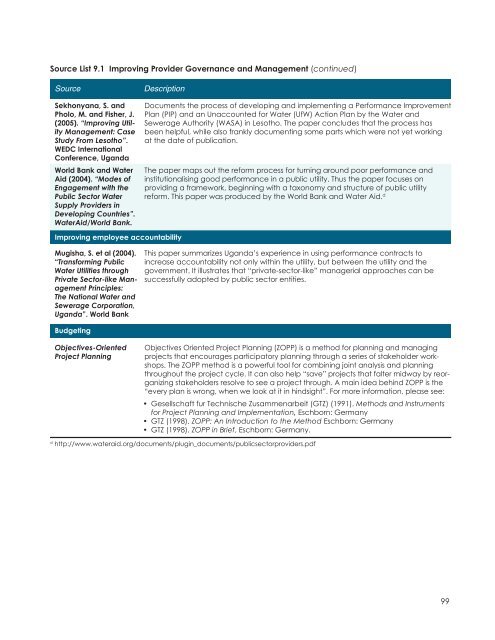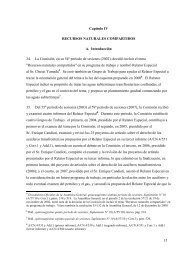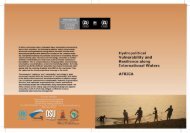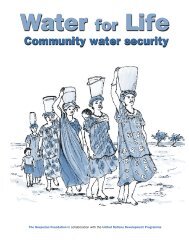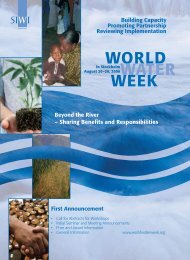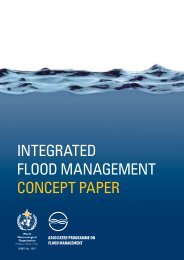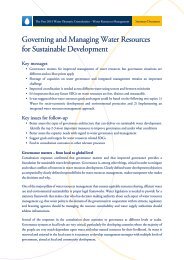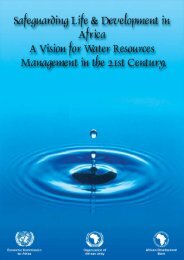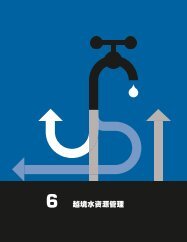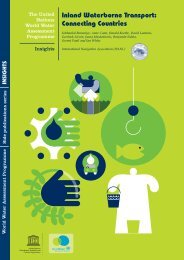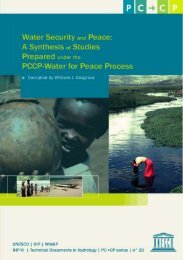A Sourcebook - UN-Water
A Sourcebook - UN-Water
A Sourcebook - UN-Water
Create successful ePaper yourself
Turn your PDF publications into a flip-book with our unique Google optimized e-Paper software.
Source List 9.1 Improving Provider Governance and Management (continued)<br />
Source<br />
Sekhonyana, S. and<br />
Pholo, M. and Fisher, J.<br />
(2005). “Improving Utility<br />
Management: Case<br />
Study From Lesotho”.<br />
WEDC International<br />
Conference, Uganda<br />
World Bank and <strong>Water</strong><br />
Aid (2004). “Modes of<br />
Engagement with the<br />
Public Sector <strong>Water</strong><br />
Supply Providers in<br />
Developing Countries”.<br />
<strong>Water</strong>Aid/World Bank.<br />
Description<br />
Documents the process of developing and implementing a Performance Improvement<br />
Plan (PIP) and an Unaccounted for <strong>Water</strong> (UfW) Action Plan by the <strong>Water</strong> and<br />
Sewerage Authority (WASA) in Lesotho. The paper concludes that the process has<br />
been helpful, while also frankly documenting some parts which were not yet working<br />
at the date of publication.<br />
The paper maps out the reform process for turning around poor performance and<br />
institutionalising good performance in a public utility. Thus the paper focuses on<br />
providing a framework, beginning with a taxonomy and structure of public utility<br />
reform. This paper was produced by the World Bank and <strong>Water</strong> Aid. d<br />
Improving employee accountability<br />
Mugisha, S. et al (2004).<br />
“Transforming Public<br />
<strong>Water</strong> Utilities through<br />
Private Sector-like Management<br />
Principles:<br />
The National <strong>Water</strong> and<br />
Sewerage Corporation,<br />
Uganda”. World Bank<br />
This paper summarizes Uganda’s experience in using performance contracts to<br />
increase accountability not only within the utility, but between the utility and the<br />
government. It illustrates that “private-sector-like” managerial approaches can be<br />
successfully adopted by public sector entities.<br />
Budgeting<br />
Objectives-Oriented<br />
Project Planning<br />
Objectives Oriented Project Planning (ZOPP) is a method for planning and managing<br />
projects that encourages participatory planning through a series of stakeholder workshops.<br />
The ZOPP method is a powerful tool for combining joint analysis and planning<br />
throughout the project cycle. It can also help “save” projects that falter midway by reorganizing<br />
stakeholders resolve to see a project through. A main idea behind ZOPP is the<br />
“every plan is wrong, when we look at it in hindsight”. For more information, please see:<br />
• Gesellschaft fur Technische Zusammenarbeit (GTZ) (1991). Methods and Instruments<br />
for Project Planning and Implementation, Eschborn: Germany<br />
• GTZ (1998). ZOPP: An Introduction to the Method Eschborn: Germany<br />
• GTZ (1998). ZOPP in Brief, Eschborn: Germany.<br />
d<br />
http://www.wateraid.org/documents/plugin_documents/publicsectorproviders.pdf<br />
99


